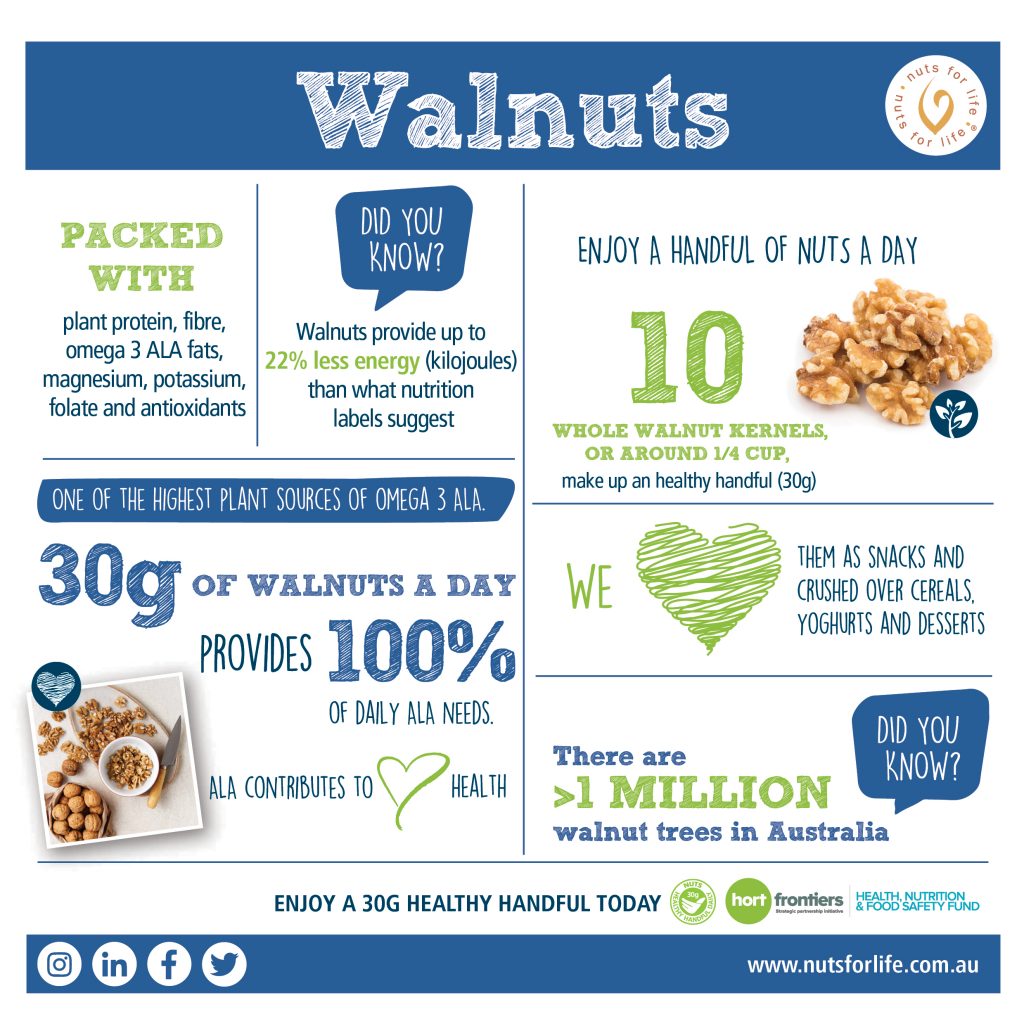Walnut Day

Walnut Day
Walnuts are a delicious and nutritious tree nut – certainly worth celebrating this Walnut Day! Mark 17 May with a healthy handful of walnuts, and reap the nutrition and health benefits of this tasty and versatile nut.
Walnuts and diet quality
A modelling study, published in 2023, found replacing some meat with walnuts improved overall diet quality in US-based children, adolescents, and adults, who didn’t usually eat nuts (1).
It found that the partial replacement of meat with walnuts could result in:
- Increased intake of omega-3 (in the form of alpha linoleic acid, or ALA)
- Increased intake of fibre, magnesium, and copper
- Decreased intake of cholesterol
- Decreased vitamin B12 (though levels were still above the daily recommendation when walnuts replaced up to ~85g of meat)
- No significant change in iron.
Thanks to the crumbly texture of chopped walnuts, they make a handy addition, partial replacement, or replacement to regular mince, in a variety of recipes. The perfect way to get more plant foods into the day!
Fast facts about walnuts:
- Walnuts are one of the few plant sources of omega-3 fats, in the form of alpha-linolenic acid (ALA), which can reduce inflammation and help prevent chronic disease.
- A handful of walnuts (30g, or around ¼ of a cup, or 9-10 whole walnuts) contains 1.9g of omega-3 ALA – by far the highest of all nuts.
- They not only look like brains, but walnuts are good for them too! Research suggests that the polyphenols, tocopherols, and polyunsaturated fats (PUFA) in walnuts may contribute to better cognitive function.
- Walnuts make a healthy AND affordable snack. A 30g handful of walnuts comes in at less than 85 cents.
- Walnuts are rich in antioxidants that protect the body’s tissues from damage, so play an important role in healthy aging.
- Walnuts are packed with plant-protein and fibre, and essential vitamins and minerals, including vitamin E, a powerful antioxidant; magnesium, a nutrient that can help fight fatigue; potassium, for healthy nerve and muscle function; and folate, which helps make healthy red blood cells.
- A healthy handful (30g) of walnuts contains 4.3g plant protein.
- A ‘walnut-supplemented’ diet can increase intake of PUFA, omega-3s, plant protein, fibre & most vitamins & minerals, & also partially displace non-alcoholic beverages, desserts, candy, sugar and sweets in the diet (2).
A recent study looked at the link between walnut consumption and cognitive function in more than 3,600 US adults, aged 65 years or older. Those who ate walnuts had higher cognitive scores at baseline, than those who didn’t consume walnuts (3).

Try these walnut recipes




References
- Spence, LA., et al. A dietary model of partial meat replacement with walnuts demonstrates changes in the nutrient profile and quality of the United States population’s diet. Nutrients, 2023. 15:4518. https://doi.org/10.3390/nu15214518
- Natto, ZS., et al. Food and nutrient displacement by walnut supplementation in a randomized crossover study. Nutrients, 2022. 14:1017.
- Bishop, N., & Zuniga, K. Investigating walnut consumption and cognitive trajectories in a representative sample of older US adults. Public Health Nutrition, 2021. 24(7):1741-52.

